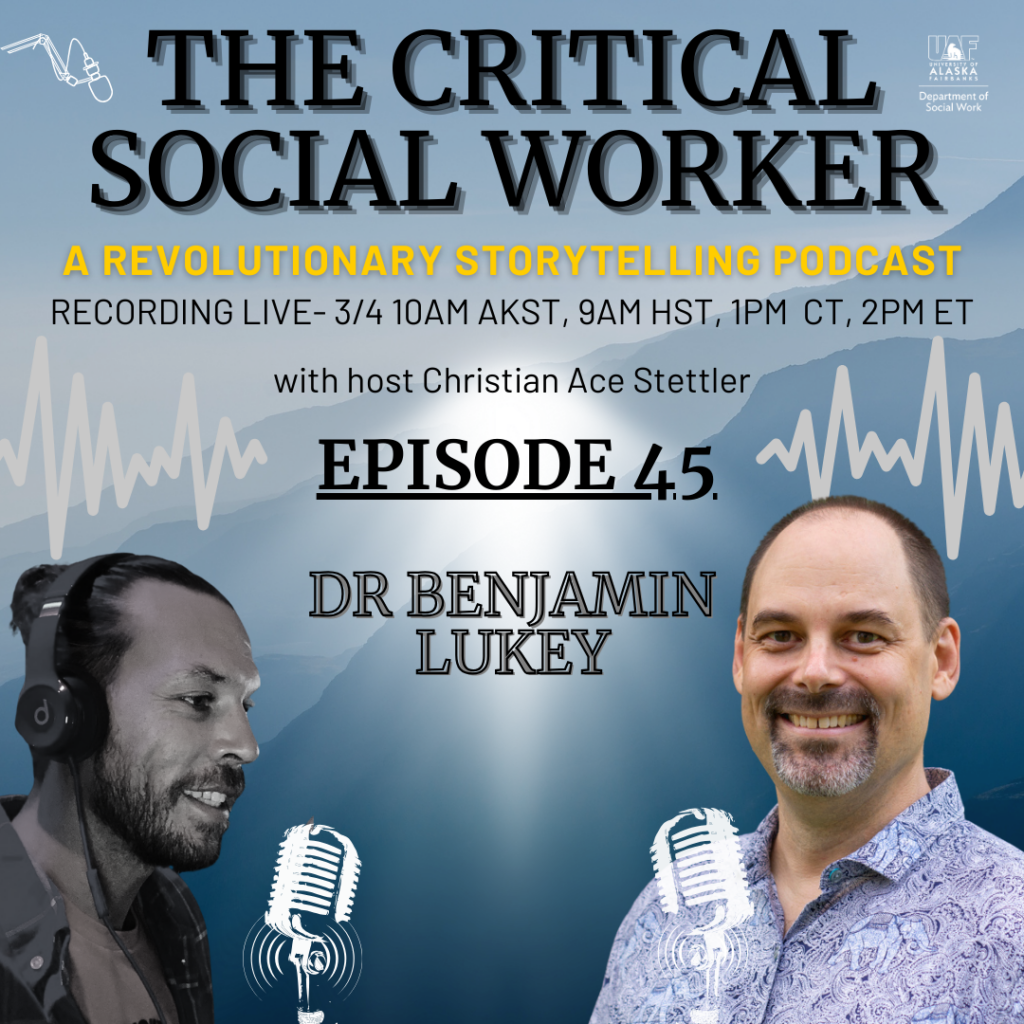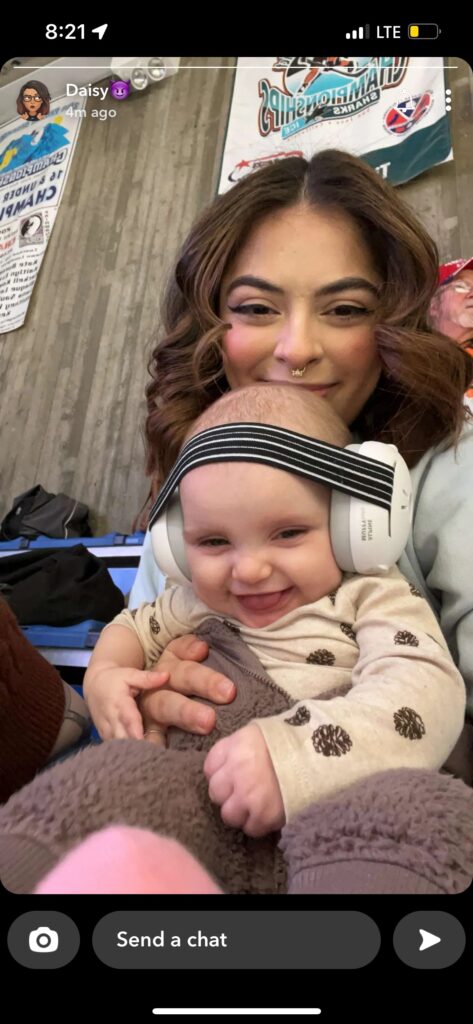
I had the opportunity to listen to a captivating podcast, The Power of Curious Inquiry, with host Christian Stettler and guest Dr. Ben Lukey, a professor of philosophy at the University of Hawaii at Manoa. He also works with Hawaiian public schools to teach Philosophy for Children (P4C) by integrating talking circles into elementary and high school classes. It was also the podcast’s almost one-year anniversary! In this podcast, the host and guest go over many topics, such as TV shows and books with kids, creating an environment to share our thoughts, and discussing the importance of talking circles and how it can impact children’s futures.
Episode 45: The Power of Curious Inquiry | A Dialogue with Dr. Benjamin Lukey (youtube.com)

Picture is my baby at a Icedogs game
In the beginning moments of the podcast, Christian and Dr. Ben reflect on how they boned over watching TV shows with their children and being a father. Dr. Ben commented that they have been “ shifting from televised series to YouTube lately.” This statement made me giggle because I related to it so much. Many people now do not have cable but have programs like Netflix, Disney Plus, Hulu, etc. In our own house, we watch a lot of YouTube videos. We watch alot of kid and baby shows for my baby, like Mrs Rachel and Jack Hawlore. However, after some minutes of this banter between Christian and Dr. Ben, Christian brings up how he “views what’s age-appropriate differently.” I really wanted to touch on this because it resonated with me. I believe that exposing your kids to various things while they are young while you can oversee the situation can be an excellent thing for the child.
My husband and I rarely go on dates because we bring our little girl everywhere. We have brought her to fancy restaurants, hiking, and endured long car and plane rides. We have also brought her to breweries and parties. This expands my child’s comfort zone and, hopefully, in the future, this will allow us to have a better conversation about the more challenging things in society. I want to have trust and open discussion in my household. I don’t want my child to feel uncomfortable talking about anything to me. To me, being able to build this with your child starts even when they are little. Even if they don’t remember it, their early experiences still shape them, and now, the end of her comfort zone is a 13-hour travel day. Side note: If I ever see my child is not okay or is super uncomfotable, I will remove her from the area and make sure she is okay first and formost. I never push her limit that she gives me.

The podcast talks about how there are very few environments where we can think together. What I gathered is that this means we don’t have alot of space to let down our barriers and be able to listen and learn from each other without “violent language,” as Christian put it. Dr. Ben goes on to talk about these barriers and as we get older, the more we have. I related this to our generation’s idea of “cancel culture.” Most of us are scared to share our thoughts and opinions in a large group because a alot of subjects have turned political or people are very defensive. For example, it is hard to talk about my core values or beliefs now without someone else conforming me into a political box or outright disrespecting me. This greatly hinders us as a society because now we only have a right and a wrong. Where is the middle ground? Where can we learn from each other? This goes back to the fact that we don’t have many environments to think together.
When Dr. Ben facilitates or helps teachers facilitate these talking circles or P4C, he is creating a learning environment for children that is different from the Western education system we have all grown accustomed to. This is important because it shows that wonder and curiosity are acceptable and that they are a good thing. It teaches kids to talk less and listen more from a younger age than when we usually learn it. Christian said it well: “Education is a transaction system.” When we attend school, we get a pre-made curriculum, standardized testing, and pressure to perform a certain way. When we have these talking circles in schools, especially public schools, that can be hardening on children, we create an environment where students can feel validated and empowered.

One question, however, that kept coming to my mind during this whole topic is, do you get any backlash from parents from talking circles? Fortunately, someone in the audience also had the same question, and Dr. Ben answered it, “ Yes, but it is far less likely than you think for two main reasons. One the kind of internal reason, which typically, as we engage in these types of inquiries, we recognize that we’ve developed a certain amount of trust right? And so there’s almost like an ethos of what’s said in the circle stays in the circle, right? The other is, we are a part of a teacher’s classroom. And there are a lot of times teachers have things that they’re really uncomfortable talking about.” Dr. Ben then goes on to discuss that kids recognize this and we develop a sensitivity of what we really don’t feel comfortable talking about.
I completely understand where Dr. Ben is coming from about this. However, in certain areas of this country, just talking about anything besides math, English, history, and science can put the teacher at risk or even their job. However, I do agree with what Dr. Ben said next: “If the kids want to think about this together, we then have the next question: Do we want to think about it with them? And if a teacher says no, fine.” I think we as parents always want what’s best for our kids. Every parent views what is best for their kid entirely differently than another. That is okay, too. I just want to point out that kids are curious about their own selves, now do we hinder that exploration of self or do we empower them to have their own ideas, thoughts, and identity?

In conclusion, I loved this podcast. It was intriguing to listen to and fun to create my own questions and thoughts about the discussion. One of the biggest lessons I ever learned in life is that every human wants to be accepted and loved. That’s the one thing we all share. I believe that if we can empower our future generations to have more open minds and to see more than what is right and what is wrong, then we can be better as a community. We can better understand each other and the world around us. That is what talking circles can do. They can create a safe space for open minds, open conversations, and a better understanding of life and the world.
Christine Ryan
Thank you, Bell, for sharing your thoughts and a picture of your sweet baby. I agree with you on bringing your children everywhere and letting them have those experiences. My first son was born in 2018 and he went everywhere with us. A first baseball game at 7 weeks and two years of attending college football games. He experienced a lot, and I can see his love for adventure. My daughter was born on Thanksgiving in 2019 and with my husband being deployed and RSV season I stayed home (also outnumbered by 2 kids under 2). When my husband returned in late February 2020, we started to explore. Then BOOM Covid 19 hit we became prisoned in our house for some time. My daughter, unfortunately, did not get to experience the world till a little later in life and that has made her more shy, her whole preschool class has a different approach than the year prior. I also agree with having those conversations with our children, they listen and absorb what they hear, and they can have more conversations that are deeper than we give them credit for. I made a deal with my husband before we had children about never talking to them like babies, softening our voices. Our children deserve to be talked to and have an understanding of the world they live in.